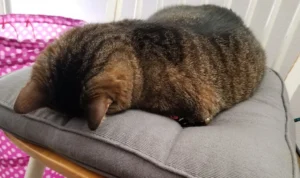Some dogs have a quirky habit of scratching the floor as if they’re preparing a cozy nest. You might have caught your pup doing this and wondered what’s going on in that furry little head.
Dogs scratch the floor for a variety of reasons, including instinctual behavior from their wild ancestors who would create comfortable sleeping areas, marking territory, or simply expressing excitement or boredom. Yet, the reasons behind this behavior can be more nuanced than they seem at first glance. Scroll down to uncover the fascinating details behind this doggy habit!

Why do dogs scratch the floor?
Dogs scratching the floor isn’t just a quirky trait; it’s rooted in instinct and comfort. Instinctual behavior plays a huge part. In the wild, canines would dig to create a cozy resting spot or to uncover hidden food. Your pup might be channeling these ancient behaviors while trying to make their space feel just right.
Comfort-seeking is another big reason. Scratching might help them rearrange bedding for a cozier spot, especially if they’re feeling restless after a nap. It could also be a way to explore their surroundings, using those sharp claws to investigate scents and textures.
Sometimes, the scratching may even stem from their need to create a safe space. Different surfaces, like carpet versus hardwood, can feel different under their paws, influencing this behavior. So when you see them scratching away, it’s often a mix of instinct and the pursuit of comfort.
Is scratching a sign of anxiety?
Scratching can indeed be a window into your dog’s emotional state.
If your furry friend seems to scratch excessively or in specific situations, it might point to anxiety or stress. Dogs often engage in this behavior as a coping mechanism.
For example, imagine a loud noise or a change in routine. If your dog feels uneasy, they may start scratching as a way to comfort themselves. This is particularly common in rescue dogs or those with a history of trauma.
To help identify if anxiety is at play, watch for other signs, like:
- Pacing or restlessness
- Excessive barking or whining
- Destructive behavior in general
If you notice consistent scratching tied to these symptoms, consider reaching out to a vet or a dog behaviorist. They can offer tailored strategies, like training techniques or even calming aids, to help manage your dog’s anxiety. Addressing the root of the scratching ensures your pup feels safe and secure in their environment.
How does scratching relate to playfulness?
Scratching the floor often goes hand-in-hand with a dog’s playful nature. For many pups, it’s a way to interact with their environment, kick up some dust, and engage their instincts. Think of it as a natural behavior that stems from their ancestral roots. In the wild, canines would scratch to make their sleeping area more comfortable or to unearth food. Your furry friend might be reenacting those instincts when they scratch the floor, especially if they seem to do it when they’re excited or looking for something to play with.
This behavior is often seen before a game of fetch or during a play session, where dogs engage with the floor as if it’s an unclaimed territory that needs marking. If you notice your dog scratching in this context, it’s likely just their way of channeling energy and having fun. Providing them with toys or engaging in play can help redirect this energy positively, offering both mental and physical stimulation.
Can it be a sign of illness?
While scratching can be playful, it might also signal a health issue. If your dog is excessively scratching, there could be several potential causes worth investigating. Here are some common health-related factors:
- Allergies: Dogs can suffer from food or environmental allergies, leading to discomfort and scratching. Look for other symptoms like redness or inflammation.
- Skin infections: Bacterial or fungal infections can cause itching. If your pup’s scratching seems persistent and is accompanied by rashes or sores, it’s time for a vet visit.
-
Parasites : Fleas, ticks, or mites can make your dog incredibly itchy. A quick check can help you identify any unwanted hitchhikers.
-
Stress or anxiety : Sometimes, dogs scratch as a coping mechanism. Changes in their environment or routine can cause stress-related behaviors.
Keep an eye on your pup’s scratching habits. If it seems excessive or if they’re showing signs of distress, consulting with a vet is always a good decision. Early detection can lead to simpler resolutions and keep your dog feeling their best.
What breeds are more prone to scratching?
Certain dog breeds are more likely to engage in scratching behavior, and understanding their traits can help explain this tendency.
Breeds with a strong instinct to dig or nest, like Terriers, Hounds, and Collies, often combine physical activity with mental stimulation through behaviors like scratching. For instance, Jack Russell Terriers have a natural digging instinct derived from their hunting background, while Beagles might scratch in search of scents hiding beneath the surface.
Another breed notable for scratching is the German Shepherd. Their intelligence and working dog background mean they need plenty of mental and physical outlets. If they feel bored or restless, scratching may become an outlet for their pent-up energy. Similarly, Labrador Retrievers, with their playful nature, might scratch when anxious or seeking attention.
It’s also worth considering how traits like anxiety or even relaxation come into play. Some dogs will scratch to create a comfy spot before settling down, demonstrating their instinctive behavior to nest. Recognizing breed characteristics can help determine if scratching is a unique behavior tied to their lineage or a response to their current environment.
How does the environment impact scratching?
The environment plays a significant role in how and why dogs scratch. Flooring material can affect scratching habits significantly. For instance, softer surfaces like carpets invite dogs to scratch, as they mimic the earthy ground they would encounter in the wild. Dogs often perceive this as an opportunity to nest or dig. Conversely, hardwood or tile floors might be less inviting, reducing scratching behavior.
Space also matters. Cramped areas might stress dogs, leading them to scratch as a way to alleviate anxiety or boredom. A spacious environment with room to roam can provide ample distractions, keeping their minds busy and lessening the urge to scratch.
Temperature is another factor. In warmer climates, dogs may scratch to cool down or create a comfortable sleeping spot. In contrast, dogs might scratch more in colder areas, trying to nestle into their surroundings for warmth.
If your dog’s scratching seems excessive or leads to skin irritation, it could be time to adjust their environment or consult a vet.
Sometimes, simple changes like providing a cozy bed or engaging in more interactive play can reduce scratching behavior significantly.
Is scratching ever a cause for concern?
Scratching the floor can be a quirky behavior that many dogs exhibit, but there are times when it warrants a closer look. Often, dogs scratch to create a comfy spot, similar to how they’d “nest” in the wild. However, persistent or obsessive scratching could signal underlying issues.
Look out for these signs that might indicate a problem:
- Skin irritation or injury: If you notice redness, swelling, or hot spots on your dog’s paws or body, it could be a sign of allergies, parasites like fleas, or infections.
- Behavior changes: Sudden changes in your dog’s scratching habits or an increase in anxiety-related behaviors may suggest discomfort or stress.
- Lack of improvement: If scratching seems excessive and doesn’t improve with time or basic remedies, it’s best to consult a veterinarian. They can assess for conditions like allergies or behavioral issues that may require treatment.
Paying attention to these details can help you determine when to seek professional help.
Alex, a passionate animal lover, has experience in training and understanding animal behavior. As a proud pet parent to two dogs and three cats, he founded AnimalReport.net to share insights from animal experts and expand his knowledge of the animal kingdom.





Nice i really enjoyed reading your blogs. Keep on posting. Thanks